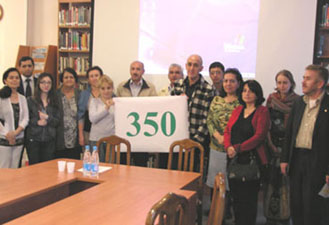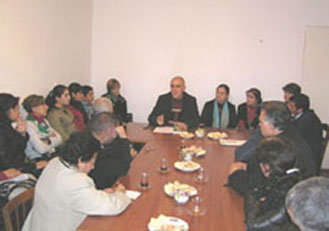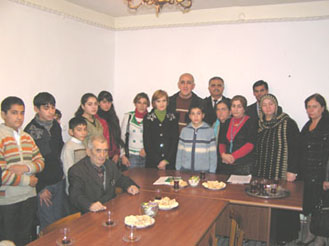
RELIGIOSITY CHALLENGING ECOLOGICAL CRISIS |
|
| On
October 24, 2009 Azerbaijan Center for Religion and Democracy
(ACRD) held discussions on “Religiosity Challenging Ecological
Crisis”. The event organized by American Alumni Association
in Baku at American Center was timed to an international justice
day on the earth within the international climate protection
movement “350” campaign which had chosen 24th of October as
such. He also said that many efforts are being made now to help solve environmental problems at the international level to create ecology-oriented movements, pursue certain politics and so on. The reason that all that proves to be not enough leads to increasing numbers of those who seem supportive to the idea that the measures to solve the problems linked to environmental crisis are to be considered in a interlocking context with problems of morality. As from the religious perspective what we see nowadays is that religious values are increasingly occupying public mind, religious processes are getting intensified with the passage of time partly due to globalization processes necessiating mutual interaction of different cultures and religions. Therefore it seems quite effective to try to put the possible moral potential of religions at the service of environmental activities. Some people believe that not only materialictic worldview or secularism is the reason why many people seem to be so indifferent toward protecting nature. A negative contribution to this was made also by religions either with crisis of superstitions they faced over certain periods of history as concepts on next world human salvation claiming values which traditionally constitute the main religious ideology of monotheistic religions have at many points been pursued in a context where the human-being was kept away from need to take care of worldly life. Some scholars believe that this has provided dominion of humans over nature and led to a devaluing of the natural world and a subsequent destruction of its resources for utilitarian ends as personal salvation concept which mainly emphasize other worldly goals and reject this world as corrupting has certainly played negative role. Anyway one of the historical and cultural reasons of current environmental crisis is seen to be linked to this as well. So on the one hand, the fact that environmental issues when being brought to the agenda of religious values can also help adapt religions to the contemporaneity thus get back to its holy essense. On the other, discussions on Religion and Ecology have to be viewed in fact as one the most effective means to create good climate for interfaith initiatives. The new realities show that public mind can be affected mostly by religious persons unlike Soviet times. Adaptation of religious teachings to the task of revaluing nature so as to prevent its destruction marks a significant new phase in religious thought. Formulation of a new ecological theology and environmental ethics along with a new generation of theologians in this field are already emerging from within Judaism, Christianity, Islam, Bahaism. As
for Holy Koran, N.Gasimoglu said, it considers each creatures
in the whole universe as an evidence of God-being, His bounty
and mercy. The Koranic verses along with blaming those whose
activities aim at violation of universal balance call also on
belivers not to be indifferent towards this negative tendency
and consider this in the list of their religious duties as well.
x x x The
similar discussions were held in Khachmaz region, Azerbaijan.
The main purpose was again to promote a certain shift in the
religious mind of believers in favor of environmental problems.
The discussions in the audience of Khachmaz region community
members were aimed this time again searching for and stimulating
new contextual and morally incentive environmental initiatives
and thus to finding the ways of putting in use the potential
of believers in the direction of affecting the public opinion
in favor of environmental problems.
The participants welcomed and highly appreciated open discussions and emphasized that this kind of events with the purpose to promote religiously incentive environmental initiatives would prove to be important also for introducing new reforming ideas into the agenda of local Muslims affected by medieval interpretations of Islamic religion. They also expressed their wishes that these open discussions be held in a rather frequent way in future.
|

| NEWS |
| Nariman
Gasimoglu at the target of fundamentalists.
|
 “350”
is what scientists say is the safe upper limit for carbon dioxide
in the atmosphere. Discussions started by a lecture delivered
by Nariman Gasimoglu. Talking first about the global ecological
crisis caused by harms infringed upon the nature, he emphasized
that one of the most challenging problems that the humanity
currently faces is believed to have become the breach of ecological
equilibrium on our planet. This certainly threatens both present
future generations. It is quite obvious that the breach of divine
balance coded in the nature in many cases is a human-caused
problem, the thing that naturally should concern each human-being
and in particular those being known as religious believers.
“350”
is what scientists say is the safe upper limit for carbon dioxide
in the atmosphere. Discussions started by a lecture delivered
by Nariman Gasimoglu. Talking first about the global ecological
crisis caused by harms infringed upon the nature, he emphasized
that one of the most challenging problems that the humanity
currently faces is believed to have become the breach of ecological
equilibrium on our planet. This certainly threatens both present
future generations. It is quite obvious that the breach of divine
balance coded in the nature in many cases is a human-caused
problem, the thing that naturally should concern each human-being
and in particular those being known as religious believers.
 The
Khachmaz discussions moderated by N.Gasimoglu added yet another
important initiative to activities of ACRD that it has been
involved in for years carring out religious enlightenment work
including advocacy of religious reforming ideas with the purpose
to adapt Islam to the democratic tasks thus making contributions
to civil society building issues. This will also identify a
new direction in the activities of ACRD with the focus on promotion
of formulating ecological perception from the religious perspectives
as well.
The
Khachmaz discussions moderated by N.Gasimoglu added yet another
important initiative to activities of ACRD that it has been
involved in for years carring out religious enlightenment work
including advocacy of religious reforming ideas with the purpose
to adapt Islam to the democratic tasks thus making contributions
to civil society building issues. This will also identify a
new direction in the activities of ACRD with the focus on promotion
of formulating ecological perception from the religious perspectives
as well. ACRD
gained one more chance to convey its strategic theology initiatives,
reforming ideas in the region where tendencies of religious
radicalization hide in itself signs of certain threats to the
traditional religious tolerance, cultural developments and stability.
Young believers, local intellectuals were offered the opportunities
and skills to express their ideas on various religious postulates
most importantly with the emphasis on those of environmental
context.
ACRD
gained one more chance to convey its strategic theology initiatives,
reforming ideas in the region where tendencies of religious
radicalization hide in itself signs of certain threats to the
traditional religious tolerance, cultural developments and stability.
Young believers, local intellectuals were offered the opportunities
and skills to express their ideas on various religious postulates
most importantly with the emphasis on those of environmental
context. 